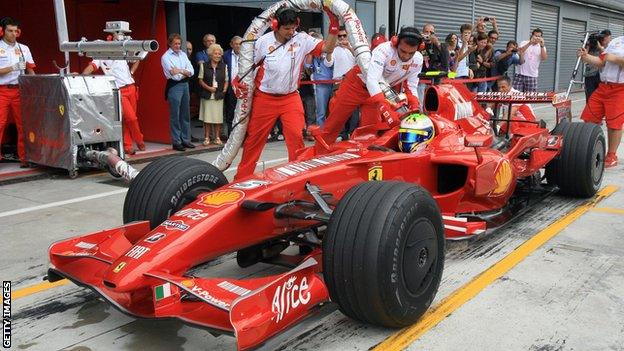Formula 1: Refuelling return to be discussed
- Published
- comments

Refuelling was last used in F1 in the 2009 season
Formula 1 bosses are discussing bringing back refuelling in 2021.
Jean Todt, the president of governing body the FIA, said he would like to bring back the practice, which was outlawed before the 2010 season.
Todt said a final decision would be made on the basis of a study on the potential effects.
"Personally, I would like to see refuelling, but I am happy to see a study on the positives and negatives," said Todt.
He said one of the benefits would be that the cars would be lighter at the start of a race as well as smaller.
Drivers such as Lewis Hamilton and Sebastian Vettel have said in recent weeks that the cars are too heavy, as part of a renewed campaign by the Grand Prix Drivers' Association to influence the future of the sport.
The cars have increased in weight in recent years by as much as 150kg as a result of the introduction of hybrid engines.
"The cars have become too heavy which is something we have discussed," said Todt, team boss of Ferrari during the team's dominant era from 2000-2004.
"I am pushing for analysing what it would mean if we introduced refuelling. If we did that you would have a lighter car at the start of the race and a smaller car."
And he rejected concerns that refuelling would lead to an increase in costs at a time that F1 has just agreed a budget cap for 2021.
"When I hear it will be more expensive it makes me smile," Todt said. "When I see the size of the [teams'] motorhomes I don't think it is the price that will be the killer to introducing it."
Todt said he had been warned that the reintroduction of refuelling would likely lead to teams' race strategies being too similar to each other but countered that that was a product of there being too much simulation in F1.
However, Red Bull team principal Christian Horner said: "My recollection of refuelling, which was part of the sport when I came into F1, was that it became just a strategic race as to how much fuel you put in at the start. You wouldn't pass any cars on track, because you would either short-fill or long-fill the car in the pit lane.
"So while it was a fascinating race for tacticians and strategists, it was a very static boring race on track. And that's why we moved away from refuelling so the drivers had to cope with a heavy fuel-load car and with that came the challenges of having to manage a car that lost 100kg during the course of a grand prix."
Todt added that he had asked FIA staff to look into whether the number of driver aids in F1 could be reduced.
He said he had been told it would not be possible for a modern F1 car to be driven without power steering.
But although F1 cars do not have common road-car driver aids such as traction control and stability control, he pointed to the fact that most starts were virtually flawless and that cars cannot stall any more as examples of areas where improvements could be made.
His comments come in the context of F1's plans to make a major change in rules for 2021 to improve the quality of the spectacle.
The cars' aerodynamics will be changed to allow them to race closer together, and a budget cap and changes to the prize money structure have been agreed in an attempt to reduce the performance differential between the teams.
The budget cap was agreed last month, but the sporting and technical regulations have to be finalised by October.
Todt admitted that the budget cap, which was agreed at $175m (about £140m) a year with exceptions for a number of areas such as the salaries of drivers and top executives, was a compromise.
"Two years ago, I was very sceptical we would finally agree a structure. Is it the best agreement? No. But I think it is the best compromise," Todt said.
He said he was "expecting a lot of controversy" over whether cap was being effectively policed.
But he added: "But I don't think a reputable organisation can take any risks of cheating because of the risk of damaging their reputation."